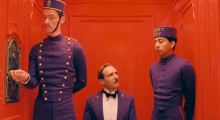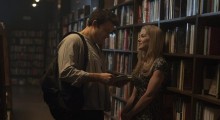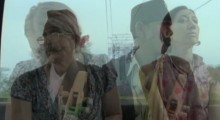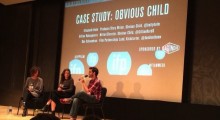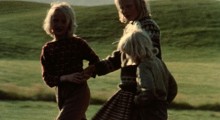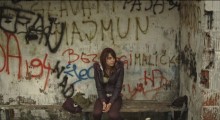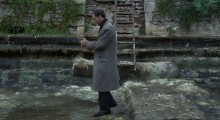Kevin B. Lee
-
Watch: Who Deserves to Win the Oscar for Best Director?

Kevin B. Lee has been churning out a series of visual supplements to oscar punditry over at Fandor that weigh politics against actual evidence, even if it is still subjective. His latest video, Who Should Win the Oscar for Best Director?, considers which of the filmmakers behind The Imitation Game, Foxcatcher, The Grand Budapest Hotel, Boyhood and Birdman, displays the most sensitive, contextually sound technique. He’s spot on in his assessments of three of the five, but I’d argue that The Grand Budapest Hotel finds a renewed cause for Anderson’s seemingly premeditated aesthetic, while Iñárritu ultimately limits himself to the very air of spectacle he […]
by Sarah Salovaara on Feb 4, 2015 -
Watch: The Best Films of 2010-14 in Supercut Form

Kicking off with a dose of Skrillex and Spring Breakers, Kevin B. Lee’s latest supercut rounds up the best films of the decade thus far. The ranking was determined on the fairly informal basis of an all-are-welcome Twitter solicitation. I voted and am bitterly disappointed, though I guess not all that surprised, to see Computer Chess didn’t make it into the top 25. The most pleasantly unexpected inclusion is Kenneth Lonergan’s much-postponed, completely wonderful and nearly buried Margaret at #5. The Tree of Life — the closest thing we have this half-complete decade to a consensus milestone in film history — tops the list. For the full of list […]
by Vadim Rizov on Jan 9, 2015 -
Watch: What Makes a Video Essay Great?

As our attention spans grow increasingly shorter in the age of information, there appears to be a growing audience for a form of film criticism beyond the written word. More precisely, for the video essay. Kevin B. Lee, the video essayist at Fandor, provides a nice inquiry into the state of the video essay today in his year-end recap, spotlighting the efforts of Tony Zhou and ::kogonada, while musing on what viewers respond to in their works: decisive analysis, politics, or the occasional cinephile fetishism. Further, Lee considers how even a narration-less supercut can adhere to its maker’s perspective based […]
by Sarah Salovaara on Dec 29, 2014 -
Watch: Josephine Decker’s Flashes of Brilliance

A considerable crowd of critical praise has coalesced around the work of Josephine Decker, most notably this “A Star is Born” piece from her longtime champion Richard Brody. Kevin B. Lee at Fandor put forth a more tempered assessment of Butter on the Latch and Thou Wast Mild and Lovely (ending their week run at the IFP Media Center today), but he also compiled this beautiful, elliptical montage of the imagery in the two films. Narrative and/or stylistic misgivings aside, it is undoubtedly clear that Decker buttresses her films with a visceral atmosphere, achieved through fine details, ethereal lighting and playful camerawork, […]
by Sarah Salovaara on Nov 20, 2014 -
Watch: Manakamana Mergings, A Video by Kevin B. Lee

When I wrote about Manakamana last year, I noted that it’s a bit disorienting, more so than the “11 rides in a cable car” premise suggests: The car can go up or down and its passengers can sit facing the direction they’re going or with their back toward it, affecting the camera’s placement opposite. Even before considering the number onboard, that’s four variables that make orientation — knowing what to anticipate in the background, which posts will be passed with a clang at what time, whether a village mid-way through the journey will be visible on the left or right, […]
by Vadim Rizov on Sep 15, 2014 -
Euro-Pudding and Look Books: Takeaways from Day One at IFP’s Filmmaker Conference

After sitting through the majority of the New Narratives presentations on day one of the Filmmaker Conference at IFP Film Week, my brain is almost too awash with content to compile anything but a listicle. From conversations with cinematographers like Reed Morano and producers like Mynette Louie to an Obvious Child case study and Kevin B. Lee’s mini-keynote, here is a handful of the major takeaways I gleaned from yesterday’s Conference. 1. For co-productions, don’t assume hiring local crew is the cheapest option. Arriving to the Icelandic set of Land Ho!, producers Mynette Louie and Sara Murphy realized they were sharing ground with a slightly larger production: Christopher Nolan’s Interstellar. […]
by Sarah Salovaara on Sep 15, 2014 -
Watch: Breaking Down the Essay Film

With the Chris Marker series underway at BAM this week, it seems like a topical time to share this 2013 rumination on the essay film from Kevin B. Lee. Lee purports that the essay diverges from the rest of cinema in how it “[explores] its subject and at the same time [explores] how it sees its subject.” Words, images and sound interact and inform one another, producing a commentary that is often relegated to the external, or the conscience of the viewer. In his visual discussion of the three pillars of an essay film, Lee draws on Marker’s own Sans Soleil, Godard […]
by Sarah Salovaara on Aug 18, 2014 -
Sexploitation and the Bechdel Test

As a woman/feminist, I put little stock in the Bechdel Test. Yes, it’s a quick means of exposing the macho-centric ways of Hollywood, but the picture grows hazier in independent and experimental film. Kevin B. Lee addressed this in a recent video essay, where he makes the case that Jem Cohen’s Museum Hours contains a richly drawn female character, despite the fact she confides in a gay man and not another woman. In a follow-up of sorts, Lee considers sexploitation films in the context of the Bechdel Test, noting that questionable motives can nonetheless earn a passing grade. While Doris Wishman’s bold melange of genres frequently downplays […]
by Sarah Salovaara on Aug 1, 2014 -
Testing the Bechdel Test

One of the clever recent innovations at the subscription streaming service Fandor is the ability to filter films using the Bechdel Test. Created by cartoonist Alison Bechdel, the Bechdel Test applies three criteria to judge the quality of female representation in a motion picture: 1) it has to have at least two [named] women in it; 2) who talk to each other; 3) about something besides a man. In a new video essay, “Beyond Bechdel: Testing Feminism in Film,” Lee interrogates the Bechdel Test using films from the Fandor library, asking whether the test is a meaningful criteria when considering […]
by Scott Macaulay on Jul 9, 2014 -
Tarkovsky’s Nostalghia as a Cinematic Candle

I’ve seen it over a dozen times, and Nostalghia‘s late, nine-minute shot of a homesick Russian poet carrying a candle across a pool in an Italian spa in tribute to his mad, suicided friend, still devastates. I always read the scene in Tarkovsky’s penultimate film as the poet’s final ritual, a symbolic act carrying its own final, life-or-death meaning. But the struggle to keep the flame lit while poised between wind and water is obviously a metaphor for life itself, which is how actor Oleg Yankovsky described it in a quote included in the text for a fascinating video based […]
by Scott Macaulay on Mar 24, 2014
